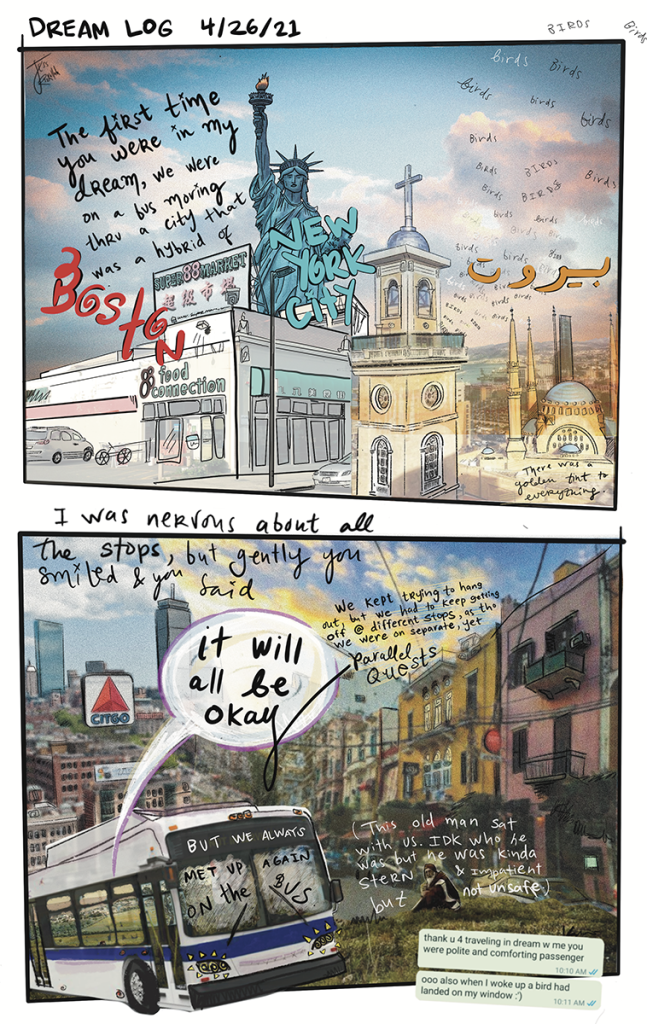
Poet and illustrator Jess Rizkallah of Boston begins her poem, “in another dimension i am a good daughter” with:
i wake up early / i sweep the floor / i put coffee on the nar
my arabic is serpentine / through dirt / ready to strike / yet i slice
apples in silence / as the men speak
of revolution / i offer fruit / on the tip of a knife / i pull from my skirt
when no one is looking.
Arabic was Rizkallah’s first language, and the poet says it has shaped how she views the world. She was born in Massachusetts after her parents fled Lebanon’s civil war in the 1980s. She learned Arabic from them, and English in school. Family and culture have always been a big part of her life, and a source from which she draws strength and inspiration. “It’s the reason why I write,” she says simply. Her first full-length collection, the magic my body becomes, won the 2017 Etel Adnan Poetry Prize. Awarded by Radius of Arab American Writers and University of Arkansas Press, the prize is named after Adnan, a Lebanese American author and artist.
“I read her work after I won the prize, and I immediately felt a kinship with her. She opened doors in my brain,” Rizkallah recalls. “And I wondered: How did I not know of her before this?” Adnan, who died in 2021 in Paris, also wrote essays and worked across such disciplines as painting, film, sculpture and tapestries. She was explicit in her political views and existential views, Rizkallah says, adding, “Her work is cosmic almost, but grounded.”
when i am named beautiful i don’t ugly my shape / out of spite /
“I write a lot of poems that are sort of about my own womanhood,” Rizkallah says, “I look at the expectations and pressures that I and a lot of women have faced.”
i sing songs about what i want /
only when i’m alone / i say ouch
as soon as the sting swells / and
don’t save the venom in my cheek
for later / i accept the limitations of my body / but still refuse
Rizkallah is comfortable in herself, and always learning. Being in a community with queer people has helped her in many ways, she says. “As time has gone on, the speaker of my poems is exploring a more expansive path. My poems engage more with this expanse.”
help / to suffer in silence is saintly / so i won’t have to admit i’d never offer my eyes to god.
Rizkallah says her poetry can be read as a conversation between nature and the world, and she frequently wonders how we can integrate that into working amongst and against hardships. “There are different resistances we have to adopt against legislation in this country and others, and against the genocide in Palestine. It is so easy to become hopeless in such a world,” she says. When she looks for where hope can be found, she finds that, “The answer is in each other, and in the world around us, through an integration of our spiritual selves into our political selves.”
when someone says with admiration
it’s as if you are a sister among brothers / i don’t
scoff / in this dimension i am still better than / all the sons /
you could have had
“I’m always wondering about the connections between the body and self and nature, and what that means in a world in the midst of climate catastrophe,” Rizkallah says. In her work, she explores the possibilities of connection, making a better country, and a better world through love. She describes herself as an artist who writes, and sometimes recites. Poetry began as an oral tradition after all, she points out. “You’re using your body to bring your poetry into the world, through your expressions, not just pen to paper,” she says. Rizkallah remembers the first few times she got up in front of an audience to read her poetry. “It was scary, but awesome,” she says.
“Doing the spoken word made me braver,” she adds. “I’m thankful to the New England poetry community and to its spoken word community.” At her readings, she gets the feeling that there are two clowns inside of her. One is a sad clown, and the other is a regular clown, she says. That inspired her to publish, and sell online, a zine of poems and artwork titled anyway, in which those two clowns are raging inside her.
Among her works, she cites california in the summer and my hair is growing long as an example of what her poetry is about. It shows her core beliefs, with humor as a big part of her work, she explains. “It’s a poem that I return to a lot.” And what’s next? “Working on finding a home for my second book,” she says. •
Rizkallah’s work can be viewed on Instagram @jessriz.art